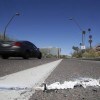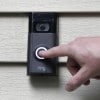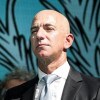Analysis | The Technology 202: Government should do more to regulate self-driving cars, investigators find after Uber death – The Washington Post
Ctrl + N

A vehicle goes by the scene of Sunday’s fatality where a pedestrian was stuck by an Uber vehicle in autonomous mode, in Tempe, Ariz., Monday, March 19, 2018. (AP Photo/Chris Carlson)
The U.S. government hasn’t done enough to ensure self-driving vehicles being tested out on the road are safe.
That’s the sobering message from federal investigators probing the fatal crash of a self-driving Uber test car in Arizona.
And it’s why the National Transportation Safety Board is now recommending that companies be required to submit their own assessments of the safety of such vehicles to the government. This is currently a voluntary practice, and inconsistent from company to company.
This recommendation came at a meeting when the board reported that Uber’s lax safety culture and insufficient risk assessments contributed to the March 2018 collision that claimed the life of a pedestrian, my colleague Michael Laris reports.
It’s the latest sign that the Arizona fatality is ratcheting up the pressure on Washington to take a heavier-handed approach when it comes to self-driving cars. It could mark the end of the laissez-faire environment tech companies and car-makers have enjoyed in recent years as they began testing the technology on the road.
Jennifer Homendy, a member of the NTSB, said at the meeting that the federal government has “put technology advancement here before saving lives.”
“I actually think that there is a major failing on the federal government’s part — and Arizona’s — for failing to regulate these operations,” she said.
These tensions probably will be on display on Capitol Hill later today, as senators grill federal transportation officials about their approach to autonomous vehicles. The witness list includes NTSB Chair Robert Sumwalt, the Transportation Department’s Joel Szabat and National Highway Traffic Safety Administration acting administrator James Owens.
NHTSA, the agency that oversees the safety assessments, told Michael that the agency welcomes the analysis and will review the recommendations. “While the technology is rapidly developing, it’s important for the public to note that all vehicles on the road today require a fully attentive operator at all times,” the agency said.
Requiring the safety assessments could significantly change how self-driving car developers interact with regulators, especially since the government would be evaluating them to ensure they are appropriate. When companies do choose to submit reports now, they’re “all over the place,” and in some instances “read like marketing brochures,” NTSB investigator Ensar Becic said at the meeting. They range from how the car detects objects to the cybersecurity of the vehicle.
The board also called the state of Arizona — a popular hub for autonomous vehicle testing — to require developers to submit an application for testing self-driving cars, which would include details about how they are managing risks associated with the car operators not paying attention. They found that the probable cause of the fatal crash was that Uber’s backup driver, Rafaela Vasquez, failed “to monitor the driving environment and the operation of the automated driving system because she was visually distracted throughout the trip.” Vasquez’s phone was streaming NBC’s “The Voice,” and she had looked down several times before the car struck Herzberg.
The board also said that other states should also adopt similar requirements, and they called on the American Association of Motor Vehicle Administrators to educate other states on the circumstances of the Arizona crash. NTSB also called Uber to implement a “safety management system” for autonomous vehicles that would include risk management.
Uber said it’s overhauled its management and technology in recent months to address the issues that NTSB raised, and the board praised its transparency and cooperation during the review. The head of safety for Uber’s autonomous vehicle division, former NHTSA official Nat Beuse, told Michael the company deeply regrets Herzberg’s death and “we remain committed to improving the safety of our self-driving program.”
This flurry of action highlights how one company’s missteps can impact the entire industry. Sumwalt, the NTSB chairman, said if you’re a developer testing self-driving technology: “This crash — it was about you.”
BITS, NIBBLES AND BYTES

LOS ANGELES, CALIFORNIA – NOVEMBER 06: Uber vehicles are lined up at the new ‘LAX-it’ ride-hail passenger pickup lot at Los Angeles International Airport (LAX) on November 6, 2019. (Photo by Mario Tama/Getty Images)
BITS: Uber will begin to listen in on U.S. riders in its latest push to address growing safety concerns, my colleague Faiz Siddiqui reports. But the feature, which was piloted in Latin America, could run up against a patchwork of American states’ wiretapping laws when launching domestically.
The new feature allows users to opt in to activate a recording on any trip or all trips, according to internal communications viewed by The Washington Post and confirmed by Uber. Users would likely be given a blanket warning that trips are subject to recording — and they should not have an expectation of privacy — but it’s unclear at what point in recording that warning would be initiated.
“When the trip ends, the user will be asked if everything is okay and be able to report a safety incident and submit the audio recording to Uber with a few taps,” Uber’s senior product manager Neil Chopra wrote in an email obtained by The Post. Uber said the files would be encrypted and password protected for security.
But laws around consenting to being recorded vary from state to state in the United States, making the technology more difficult to deploy en masse.
“They need to show that they expected they would be recorded or could be recorded in the vehicle. Absent that the fact — that it’s an encrypted file is a meaningless safeguard,” Albert Gidari, consulting director of privacy at the Stanford Center for Internet and Society, told Faiz. Otherwise, the company could run afoul of criminal laws governing wiretapping and recording oral conversations.

D.C. Attorney General Karl A. Racine. (Carolyn Kaster/AP)
NIBBLES: D.C. Attorney General Karl Racine is suing delivery company DoorDash for allegedly violating D.C. law by misleading consumers over how their tips would be used, his office announced yesterday. Legal scrutiny of gig economy company labor practices is escalating amid ongoing protests by contractors over sinking wages.
DoorDash failed to transparently disclose to consumers that, over a two-year period, their tips were used to mostly subsidize worker wages, saving the company millions, the complaint filed yesterday alleges.
While DoorDash stopped the practice this summer after public backlash, the company has yet to provide restitution to workers for lost tips, according to the lawsuit. Racine hopes to recover millions of dollars in tips from D.C. customers collected by the company during the two-year period the previous system was in place.
The company said it strongly disagreed with the lawsuit and is “disappointed by the action taken today,” DoorDash spokeswoman Becky Sosnov told my colleague Tim Carman. “We believe the assertions made in the complaint are without merit and we look forward to responding to them through the legal process.” Sosnov disputed the attorney general’s allegations that it did not clearly represent to consumers how the tip process worked.
DoorDash put $30 million toward backing a 2020 ballot measure that would overturn a new California law that could convert many gig economy workers into full-time employees after it takes effect in January.
Instacart came under fire for similar practices but agreed to stop using tips to subsidize worker pay in February. The company said it would pay back lost tips to workers. Employees continue to protest the company’s declining wages and cuts to worker bonuses.

A Ring doorbell camera. (Jessica Hill/AP)
BYTES: Police officers who download videos from homeowners’ Ring doorbell cameras can keep and share them indefinitely with no restrictions, regardless of evidence of a crime, its parent company Amazon said in a recent letter to Sen. Edward J. Markey (D-Mass.). The policies show the company’s failure to enact basic safeguards of Americans’ privacy, Markey tells my colleague Drew Harwell.
“Connected doorbells are well on their way to becoming a mainstay of American households, and the lack of privacy and civil rights protections for innocent residents is nothing short of chilling,” Markey said. “If you’re an adult walking your dog or a child playing on the sidewalk, you shouldn’t have to worry that Ring’s products are amassing footage of you and that law enforcement may hold that footage indefinitely or share that footage with any third parties.”
Police partnered with Ring can request up to 12 hours of footage dating back 45 days, Amazon’s vice president of public policy, Brian Huseman, wrote in a letter to Markey. The company also said it has no oversight mechanism to prevent the collection of footage of children, nor does it require law enforcement to provide evidence of a crime before requesting footage. Ring users can decline police requests for video at any point and would not be directly identified based on their refusal, Huseman added.
Amazon was responding to a letter Markey wrote in September, following a Washington Post report about Ring’s police partnerships. Since the Post’s report, Ring’s partnerships with law enforcement agencies increased nearly 50 percent to more than 600 agencies nationwide. (Amazon founder and CEO Jeff Bezos owns The Washington Post.)
PUBLIC CLOUD
Ever get a phone call from a number that looks suspiciously like your own? This video explains them, and what you should do about them. (Jhaan Elker/The Washington Post)
— Congress could unveil bipartisan legislation this week that would give the Federal Trade Commission and Federal Communications Commission greater ability to punish robocallers, my colleague Tony Romm reports. The pair of bills show rare bipartisan agreement in the two chambers over the growing consumer problem.
Some backers say the bill is a good start, but the recent uptick in robocalls over health insurance last month underscores the need for stricter deadlines for telecom companies to act. Of a record 5.7 billion robocalls received by Americans in October, nearly 300 million were insurance-related calls — probably made by the same organization. Robocalls aren’t illegal, making the tool ripe for potential fraud.
At least six states have warned people that health-care-related robocalls probably will worsen and have warned residents of potential scams.
The Post was unable to connect with the operator behind the alleged ring of health insurance calls and USTelecom, the industry trade group, declined to identify them or connect them. “With respect to this health-care scam, we have been responsive to government requests,” said Patrick Halley, the senior vice president of advocacy and regulatory affairs.
— More news from the public sector:
Amazon responded to a long list of questions about its practices related to a House Antitrust Subcommittee hearing over the summer.
CNBC
Senators demand info on tech firms’ efforts to curb content depicting child exploitation
A bipartisan group of senators is demanding information from 36 technology companies about their efforts to prevent the spread of material depicting child sexual abuse on their platforms.
The Hill
PRIVATE CLOUD
— News from the private sector:
Google Stadia is here, but there are still huge issues
Google Stadia launches now. But in multiple tests, we found lag ranges from a lot to a little.
CNN
Google workers protested outside of an investigation into employee retaliation days prior to the company ending its TGIF tradition, internal memo shows.
CNBC
Salesforce Conference Interrupted by Immigration Protesters
Salesforce.com Inc.’s annual software conference in San Francisco, where it introduces new products and discusses its commitment to social causes, was interrupted for the second year in a row by protests against the company’s work with the U.S. government.
Bloomberg
#TRENDING
— Tech news generating buzz around the Web:
How a maker of knockoff Bollywood tapes became the king of YouTube
The studio T-Series has overcome powerful rivals, legal challenges, gangsters and tragedy on its way to dominating the world’s biggest video-sharing site.
The Los Angeles Times
Women Are Pretending To Be Men On Instagram To Avoid Sexist Censorship
The app’s shadow ban on vaguely “inappropriate” content has disproportionately affected female users.
Huffington Post
Big Tech’s Toughest Opponent Says She’s Just Getting Started
Margrethe Vestager won praise for her oversight of the tech industry. Now, with more authority from the European Union, she envisions a more aggressive agenda.
The New York Times
CHECK-INS
— Today:
- The Senate Commerce Committee will host a hearing on the deployment of autonomous vehicles at 10 a.m.
— Coming up:
- The House Financial Services Committee will host a hearing on the role of big data in financial services on November 21 at 9:30 a.m.
- The House Energy and Commmerce Committee will host an Federal Communications Commission oversight hearing on December 5.














